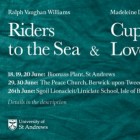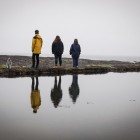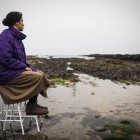Riders to the Sea 2019Byre Opera
Read more about the opera Riders to the Sea
Riders to the Sea is a concentrated one-act lyric tragedy by Vaughan Williams that is always hugely effective in the theatre. Derived from a brief drama by Irish playwright J M Synge, it packs an emotional punch. These performances used the composer's own arrangement for piano accompaniment. Riders to the Sea is an excellent work for well-trained student forces and has been performed in Glasgow at the RSAMD a number of times. However it has not yet been presented in Scotland in a fully professional staging. An extraordinary omission. If this was the first occasion for a performance outside Glasgow, it was very appropriate that it should also be played in the Western Isles.
This was a fascinating and thoroughly enjoyable enterprise. On the lookout for new venues, Byre Opera explored the big new development the University is constructing on the site of the old Guardbridge papermill. Performances of an operatic double bill took place within the new Biomass Plant, within sight and sound of the sea. The operas were staged in the open space of the entrance hall, where parts of the workings of the plant were visible. This structure, eseentially a box of steel and concrete, (think of Tate Modern in London), turned out to have a surprisingly good acoustic - resonant but clear - and should do nicely for similar ventures in future.
The whole site, on a bright summer evening, proved to be an attractive area overlooking a substantial swan-filled lagoon. As it was still very much a building site, it was necessary to transport the audience by shuttle bus the few hundred yards from the High Street. All these potentially complex arrangements worked well. A great deal of planning had clearly gone into the event. Some compensation for 'any inconvenience' was the presence on site of the recently established Eden Mill distillery, whose enthusiastic staff provided bar services and a rather nice local gin.
The performance was rightly dominated by the performance of Maurya, the tragic central character fast running out of male relations. Katherine Gunya gave a quite exceptional performance as she calmly accepted the fact that the sea could do her no further damage. The daughters are not really differentiated by the composer - though in this case Fanny Empacher began proceedings with an atmospheric celtic fiddle solo before the piano introduced itself. Both girls gave touching interpretations, clearly doomed to repeat the kind of losses their own mother had endured. Ross McArthur sang well in his brief appearance as the doomed Bartley, and spent several minutes at the end as an effective corpse - good practice for his role in the second opera.
The musical director, from the keyboard, was Claire Innes-Hopkins. She had a difficult task in making the composer's own reduction challenge memories of his wonderfully atmospheric seascape for orchestra, but did well. The stage director, P J Harris, produced an ideally concentrated effect on the tiny stage - a parallelogram with the 'pointy bit' directed at the audience, a bit of grass and a tree-stump - all that was required. Two dancers provided wave effects at the start, augmented by the tiny offstage chorus of mourners at the end. Very effective.
These performances were coupled with a completely unknown work - a highly contrasted black comedy, Cupboard Love, by one of VW's students, Madeleine Dring, whose early death is the likely reason for her unfamiliarity. It is composed for three singers and lasts only thirty minutes or so. This is thought to be its staged premiere, at least in Europe. As a coupling it was an ideally frothy companion piece.


